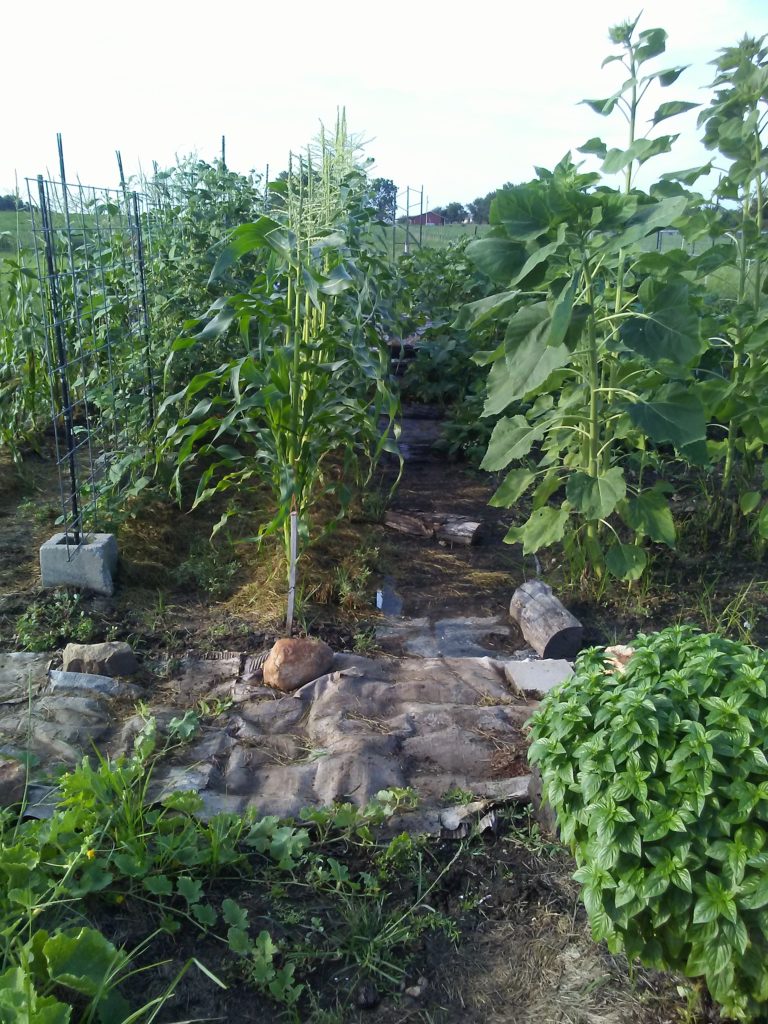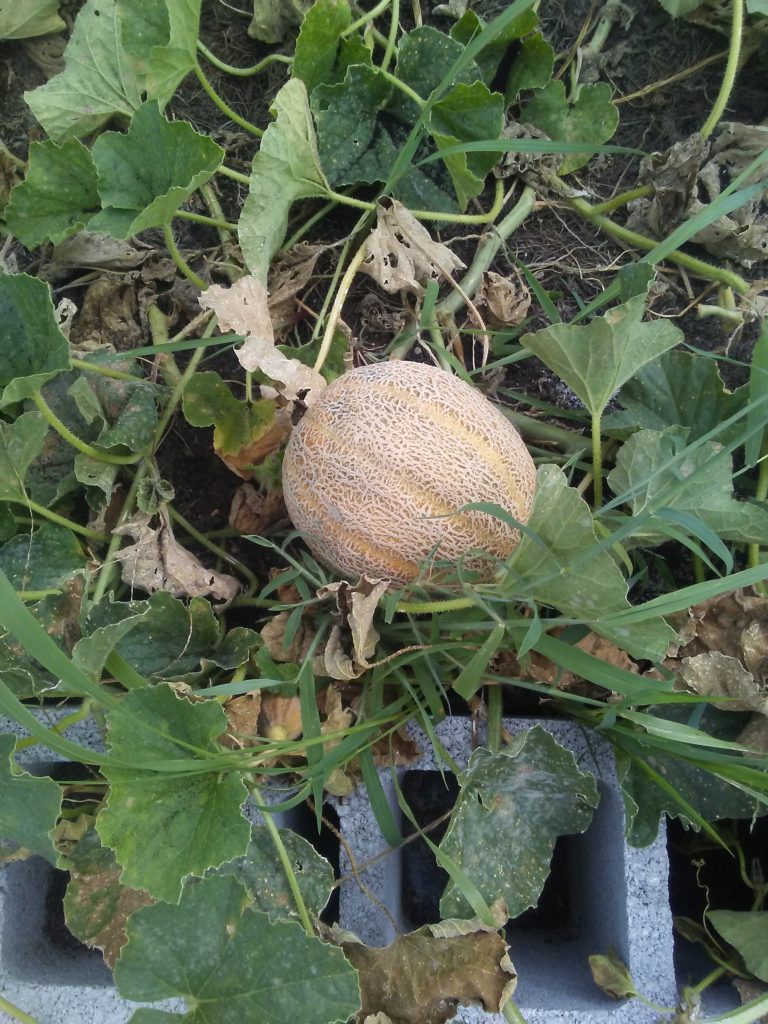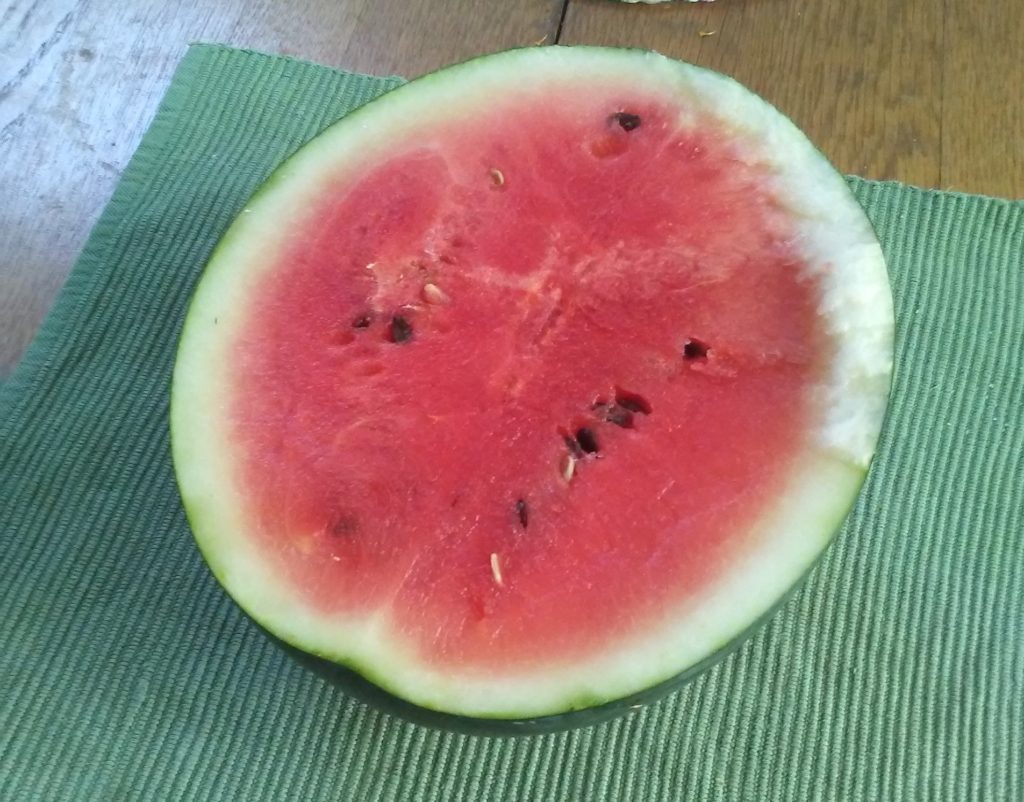Not too bad!

Big fails were tomatoes, 1/3 of which succumbed to blight (I’m never getting that variety again). The Romas and Lemon Boys did all right, and I was able to get about 14 pints’ worth of spaghetti sauce out of them, but they got pretty sad-looking by August. They’re beginning to green up again, but we’ll see if there’s enough season left for them to produce.
I got my strawberries too late (I’m never ordering from Burgess again); out of twenty plants, only three survived. They’re now spawning baby plants, so maybe I can get a row out of them for next season. All the blackberry plants died (same company–boo!). But the asparagus looks okay. Except for basil, the herbs were hit-and-miss: some parsley, chives, and cilantro, no dill or oregano. I was really looking forward to the fresh dill, too. All that stuff needs to be planted nearer the house, anyway.
Moderate success with the corn. The first row was probably planted too soon during a very rainy spring, and always looked puny. The second row went in three weeks later and did much better, though not many of the ears filled out well. Still, I got about 2 dozen substantial enough to eat, and good eating, too.

The pole beans (Blue Lake) came in with a rush: 4 lbs. in 3 days, amounting to 7 pints canned. There’s more okra than I do what to do with, which is usually the case, as I understand. But the big success: melons! I wasn’t too hopeful, as I’ve never had much success with them–never really tried, honestly. I set aside one raised bed for cantaloupe and stuck a few watermelon seeds in a vacant space. Somebody gave them to me, so why not?
The cantaloupe did great! I got at least two dozen, including this beauty:
Not all of them were uniformly sweet, but most were at least passable. It was a joy to watch them turn yellow and sunny and tumble happily off the vine.
And much to my surprise, six little watermelons made their appearance. I cut two of them too soon, while the flesh was still white–watermelons are notoriously coy about letting you know when they’re ready. But then, there was this little guy:

Overall, the successes more than balanced out the failures. We got too much rain at the beginning, but mostly adequate rainfall thereafter. I only had to water for two weeks or so. Lots of work: my one hour in the morning often stretched to 90 minutes, and my back is still sore. Definitely put more money in than I got out, but that’s not the point. Nobody I know, besides farmers, plants a garden to save money on food. There are other rewards, which I tried to express in my spring post. My views still stand, but I’ve learned a few things:
What I’ve Learned:
- Corn has to be fertilized throughout the season. I knew that, but it just got away from me.
- Tomatoes need a lot of prep and careful watching. But they can be worth it.
- Don’t mess with bush beans after June. The beetles always get ’em in July. Plant pole beans early in June and by the time the bushes are done the poles are getting their mojo.
- I worried about critters (the furry kind, not the six-legged kind) getting into the melons and corn, but several websites recommended blood meal as a possible deterrent, and it seemed to work.
- Another thing that probably worked: I got a free packet of “vine peach” seed and poked them into an open space. Because why not? Vine peach is a small lemon-colored melon, about the size of a mango, and they don’t taste like much. One of those okay-if-you-re-starving kind of plants. The vines took up lots of room and I was ready to pull them up when I read that some gardeners use them as a decoy plant to distract four-legged foragers from the melons you want to harvest. And so far, it seems to work! I’ve found several hollowed-out vine peaches while my cantaloupe and watermelon are left alone to do their own thing.
- Plant the okra all at once, not staggered, and one row is plenty.
- But I might try this next year: two rows of okra with bush beans in between. In mid-July, pull up the bush beans. In mid-August, plant lettuce where the beans were. The okra might provide enough shade for the lettuce to get a start, and when it gets too cool for okra, the lettuce will be happy to keep growing.
- Try to keep ahead of the bugs, instead of cleaning up after them. I say that every year.
The work isn’t done. I need to tighten up the fence and bring in some topsoil to fill in the low spots and haul a scoop or two of horse manure to season over the winter and maybe turn the mulch over . . . but you notice the references to “next year”? Next year could be a total bust–you never know. Gardening is not something you can predict, but neither can you lay back and coast.



